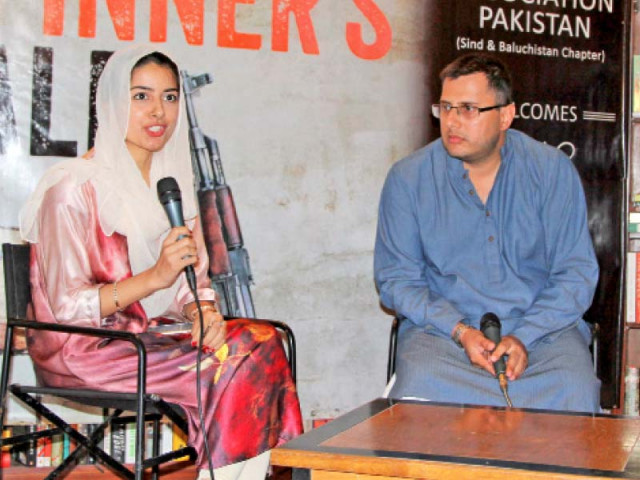Mightier than a gun: Hamid spins a tale so gripping even his muse wants a copy
Writer Omar Shahid speaks about his latest novel at T2F

Omar Shahid Hamid sits with a moderator at T2F at the launch of his second book, The Spinner’s Tale. The book revolves around the life of Omar Saeed Sheikh, known for his role in kidnapping and murder of Wall Street Journal reporter Daniel Pearl. PHOTO: AYSHA SALEEM/EXPRESS
"I'm not particularly a literary person … I stumbled upon it," the cop-turned-author says of putting pen to paper at the launch of his second book, The Spinner's Tale, at T2F on Saturday. "Now, I find the process [of writing] cathartic, probably because writing enquiry reports did not, or rather should not, have room for a lot of creative writing."
Arranged by the British Alumni Association's Sindh and Balochistan chapter, the book launch was an opportunity for Hamid's fans to interact with him and possibly get a signed copy. But for all those who have already read the book, it was a no-brainer: to hear from the horse's mouth which criminal his latest book's central character is based on?
The Prisoner's popularity lent a large part to Hamid's ability to veil real events under a gritty sweatshirt of fiction. Yet, as one read on, it was impossible to not think about the inspiration behind these volatile, yet relatable, characters. Is that shootout based on Murtaza Bhutto's murder? Is that police officer Chaudhry Aslam or Shahid Hayat? Most times, though, he will keep you double guessing, having mashed multiple events and characters into one person or episode for a deliciously soggy sludge of storytelling.
The Spinner's Tale differs from its predecessor in the sense that while the first book was focused on the police, the second maps one man's journey to a mindset of extremism. Both the books have, however, narrative ties to the life of Omar Saeed Sheikh, most known for his role in the kidnapping and murder of Wall Street Journal reporter Daniel Pearl. The Spinner's Tale, in particular, borrows much from his life to carve out the character of its antagonist Sheikh Ahmed Uzair Sufi, or Ausi as his friends called him.
Interestingly, Omar Saeed Sheikh is not unaware of his life gracing the pages of Hamid's books, albeit with some creative license. Hamid shares with the audience at T2F an anecdote post-release of The Prisoner. Having read a review of the book in an English newspaper in prison, Sheikh told a policeman who was a friend of Hamid's that the book was about him. The policeman hadn't read the book himself but agreed to get a copy for Sheikh, who in return promised to end his hunger strike. But as fate would have it, Hamid's friend was transferred the next day and Sheikh never got a copy of The Prisoner.
Having a Jihadi know you've used his life to pen a novel, part racy part violent, would deter many an author. But for Hamid — who has served in the police for 14 years, seen his father murdered by a political activist and mounted consequent pressure on authorities to take down a man as feared as Saulat Mirza — nonchalance is not really an option. "The Prisoner is just a book. Our relationship with them [criminals] runs much deeper," he says grinning. It is not difficult to see it is a bittersweet smile.
Published in The Express Tribune, July 26th, 2015.



















COMMENTS
Comments are moderated and generally will be posted if they are on-topic and not abusive.
For more information, please see our Comments FAQ